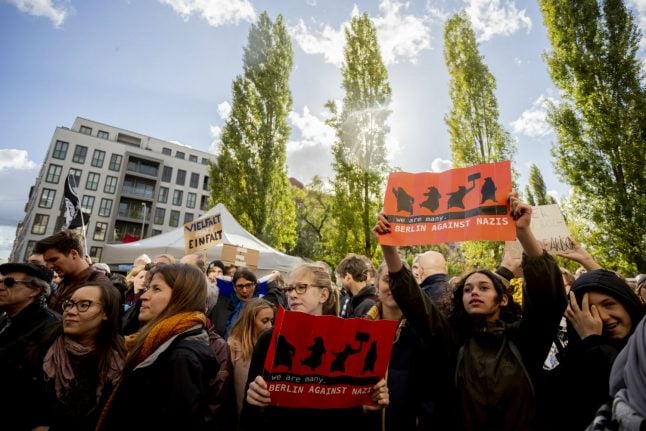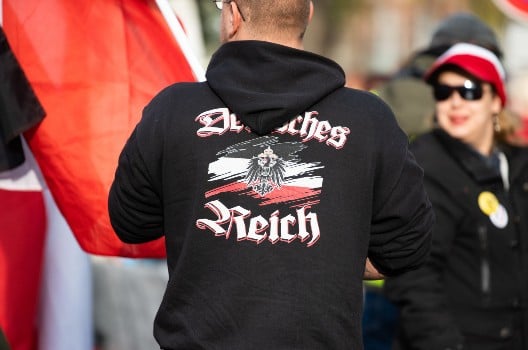The march by nationalist group Wir für Deutschland (WfD) – We are for Germany – was banned by the Berlin state earlier this week. But the group appealed the ban successfully and on Friday, the organizer posted on the WfD Facebook page to say that the march would go ahead.
Anti-fascist groups are urging people to join their counter-protest on Friday evening.
The WfD group, which says it stands up for German culture and identity, wants to host a “march of sorrow for the victims of politics” through the centre of Berlin. An organizer told The Local it was being held for people who died while trying to cross the Berlin Wall.
But opponents said the demonstration was a “provocation” and inappropriate at a time of remembrance for Jewish people.
A spokesman from Berlin gegen Nazis, (Berlin against Nazis) a project that works against right-wing extremism and racism, told The Local: “The broad counter-protest by different initiatives and groups is being held to stand against this right-wing extremist group.
“It’s a deliberate provocation that they want to march on November 9th, the 80th anniversary of the pogrom night. On this day we remember Jewish victims of the Holocaust.”
On November 9th 1938, Nazi thugs launched brutal attacks on Jewish people across Germany, in what became known as 'Kristallnacht' or the 'Night of Broken Glass'.
During the night, Jews were murdered, displaced and detained, shops under Jewish ownership were looted and destroyed, while synagogues were burnt down in arson attacks.
The horrific attacks paved the way for the mass murder of Jews by Nazis in concentration camps across Europe.
To mark the anniversary of the pogrom night, people across the world are remembering the victims of the Holocaust and Jewish persecution.
Several commemorative events are taking place across Germany on Friday, with many people lighting candles or gathering together to remember the victims.
'Intolerable'
Earlier in the week, Berlin's Interior Senator Andreas Geisel (SPD) enforced a ban on the WfD demonstration.
The event “would blatantly negate the meaning and moral-ethical significance of this day of remembrance,” a letter from the authority to the organizers said. The ban also extends to all substitute events.
Geisel said: “I find the idea of right-wing extremists marching through the government district on the 80th anniversary of the Reichspogromnacht – possibly in the dark with burning candles – intolerable.
“We can no longer tolerate open right-wing extremism acting under the disguise of freedom of expression. Here, all democrats have to stand united to say: Stop. Thus far and no further.”
However, after the ban was appealed through a court process, German media reported that the Interior Senate would go to a higher court and try and enforce their decision.
The Central Council of Jews had welcomed the initial ban. “The demonstration would have shamefully abused the memory of the victims of the Shoah,” chairman Josef Schuster said, reported RBB.
“Such a demonstration on the day of the November pogroms of 1938 would have been intolerable.”
He said he was pleased that “civil society resistance had formed against this demonstration at an early stage”.
“This certainly contributed to the decision to prohibit the march,” he added. “I assume that the majority of people in our country will approve of this decision.”
'It has happened and therefore it can happen again'
The Berlin-based association Vereinigung der Verfolgten des Naziregimes – Bund der Antifaschistinnen und Antifaschisten VVN-BdA (Association of the Persecuted of the Nazi Regime – and Antifascists) has held an annual event on the anniversary of Kristallnacht since 1990.
This year it’s taking place under the quote by Holocaust survivor Primo Levi: “It has happened and therefore it can happen again.”
The event starts at 5pm at at the memorial Deportationsmahnmal Levetzowstraße, in Berlin-Moabit, with speeches from people, including Holocaust survivor Horst Selbiger.
The anti-fascist demo to address the extremist march organized by Wir für Deutschland will happen after. It's being organized by an alliance of groups.
Bündnis für ein weltoffenes und tolerantes Berlin, an association of churches, trade unions, charities and further actors of civil society, has called on people to join the counter-protest which begins at Spreebogenpark at 6pm Friday.
They are calling for “everyone to raise their voice in favour of a responsible manner of dealing with German history and to defend a Berlin of open-mindedness and solidarity”.
Hopeful for appeal
An organizer of the WfD march said on Thursday he was hopeful that the ban could be appealed and the march could go ahead. On Friday he posted that the appeal was successful and the march would take place.
He said the group wanted to commemorate people who died while trying to escape the Berlin Wall. November 9th 1989 is also the anniversary of the fall of the Wall.
Around 250 participants had registered to take part.
However, authorities feared right-wing extremists would be among them.
In recent years, WfD has organized several demonstrations under the motto 'Merkel muss Weg' (Merkel must go), reported RBB.
Recently 2,000 people had marched through Berlin-Mitte on October 3rd, German Reunification Day, calling for border controls and other demands.
There were reports of some people showing the banned Hitler salute, while several others carried posters emphasizing their affiliation to the neo-Nazi scene.
A counter-protest far outnumbered the demonstrators.



 Please whitelist us to continue reading.
Please whitelist us to continue reading.
Member comments